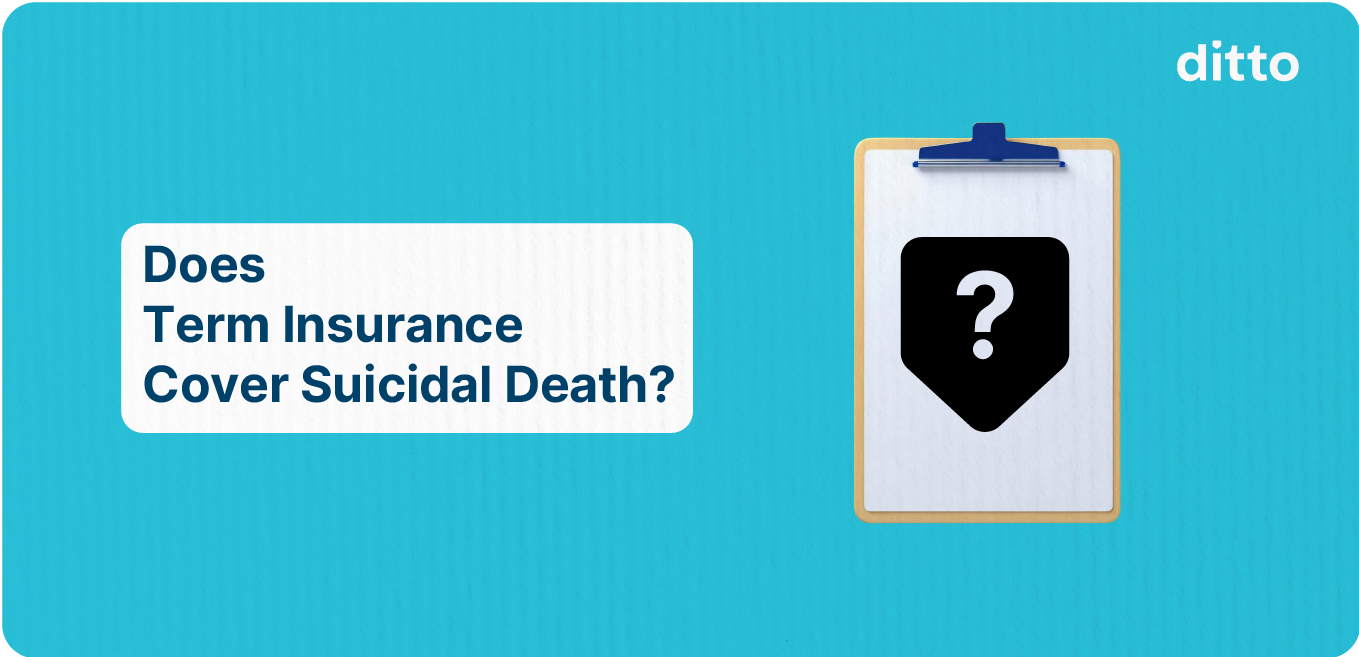Disclaimer: Suicide is an extremely sensitive issue. Ditto Insurance aims to provide clear, factual information to help families facing such tragedies. We understand the gravity of loss and intend only to offer financial guidance, not to diminish anyone’s grief.
Is Suicide Covered in Term Insurance?
Yes, term insurance covers death by suicide, but only after a one-year waiting period. If the policyholder dies by suicide after 12 months of policy purchase or revival, the nominee/beneficiary receives the full sum assured.
If the death occurs within the first year, most insurers refund 80% of the premiums paid. In ULIP plans, the insurer returns the fund value instead of the sum assured during this initial period.
Introduction
When the cause of death is suicide, the conversation around insurance becomes particularly sensitive. Finances may not be the first thing on a family’s mind, but practical questions eventually arise, such as whether a term insurance policy will provide support.
While no payout can lessen the emotional burden, understanding how term insurance works in such situations can bring clarity and help families regain financial stability.
This article offers a compassionate explanation of:
- How does term insurance in India handle claims in cases of suicide?
- What do the IRDAI rules say about suicide coverage and waiting periods?
- What can nominees expect in terms of payouts and the claims process?
The best plan is the one that fits you. Speak with a Ditto IRDAI-certified expert for clear, personalized advice. Book your free call now.
Which Types of Life Insurance Plans Cover Suicidal Death Benefits?
In India, all life insurance plans regulated by the IRDAI include a suicide clause. After a mandatory waiting period of 12 months, the nominee becomes eligible to receive the full sum assured, as per the terms of the policy.

When is Suicide Covered?
12-Month Waiting Period
If the policyholder dies by suicide after 12 months from policy inception or revival, the nominee is entitled to the full sum assured.
Within 12 Months
If suicide occurs within the first year, insurers refund 80% of the premiums paid (excluding taxes and rider charges). No cover amount is paid.
Policy Must Be Active
The policy must be in force at the time of death. Claims on lapsed or inactive policies are not entertained.
Truthful Disclosure
Mental health history must be accurately disclosed during the application. Falsification can lead to rejection, especially within the first 3 years.
Legal Protection (Section 45)
After 3 continuous years, a claim cannot be denied for misstatements unless there is proven fraud.
When Do Insurance Companies Deny Suicidal Cover?
These are the common grounds for claim denial:
- Death Within First Year: Only 80% of premiums are refunded; the sum assured is not paid.
- Lapsed Policy: No benefit is payable if the policy had lapsed and wasn’t revived before the policyholder’s death.
- Non-Disclosure: If a known mental illness was concealed during policy purchase, especially within the first 3 years, insurers may reject the claim.
- Fraudulent Claims: Claims supported by fake documents (e.g., income or medical proof) are invalid.
- Death During Illegal Activity: If the suicide occurred while the insured was engaged in criminal activity, the claim may be denied under policy exclusions.
- Exclusion Clauses: Some policies exclude claims involving intoxication or substance abuse. Review the policy wording for specific terms.
How to Claim Term Insurance After a Suicide Death?
Here’s a quick, clear guide to help you claim the term insurance with ease.
1) Visit the insurer’s official website and navigate to the “Claims” section, or walk into the nearest branch office of the insurance provider to initiate the claim process.
2) Enter basic details such as the policy number, the name and date of birth of the policyholder, your relationship to the deceased, and the date and cause of death.
3) Keep these documents ready:
- Duly filled claim form
- Original policy documents
- Death certificate
- FIR and postmortem report
- Medical and hospital records
- Identity and address proof of the nominee
- Passport-size photo
- Cancelled cheque or bank passbook
4) Submit the claim by uploading the documents online or submitting them at a branch, ensuring all details are accurate.
5) The insurer will check the documents, and if everything is in order, they’ll release the payout.
Why Choose Ditto for Your Term Insurance?
At Ditto, we’ve assisted over 8,00,000 customers with choosing the right insurance policy. Why customers like Rajan love us:

- No Spam & No Salesmen
- Rated 4.9/5 on Google Reviews by 15,000+ happy customers
- Backed by Zerodha
- 100% Free Consultation
You can book a FREE consultation. Slots are running out, so make sure you book a free call now!
Ditto Take on Suicide Coverage in Term Insurance
We understand that talking about suicide and insurance in the same breath can be uncomfortable. But our job at Ditto is to ensure you're financially informed, even in the most difficult circumstances.
That said, insurance is only part of the story. Your life is far more valuable than any payout. If you're feeling overwhelmed, talk to someone you trust or speak with a mental health expert. Techniques like Cognitive Behavioral Therapy (CBT), breathing exercises, or joining a support group can help.
Most health insurance plans now cover mental health hospitalizations, as per IRDAI rules. If you or someone you know needs immediate support, call 9152987821 immediately.
Frequently Asked Questions (FAQs)
Is suicide covered in all term insurance plans in India?
Yes, but only after a mandatory 12-month waiting period from policy start or revival. This rule is consistent across IRDAI-regulated plans.
Can a suicide claim be rejected if mental illness was not disclosed?
Yes, especially within the first 3 years, as insurers may treat it as non-disclosure under Section 45 of the Insurance Act.
Why isn’t suicide covered in the first year of term insurance?
To prevent moral hazard, IRDAI excludes suicide claims made within the first policy year.
What happens if suicide occurs after the revival of a lapsed policy?
A fresh 12-month waiting period begins from the date of revival. Suicide within that period is not fully covered.
Last updated on:









